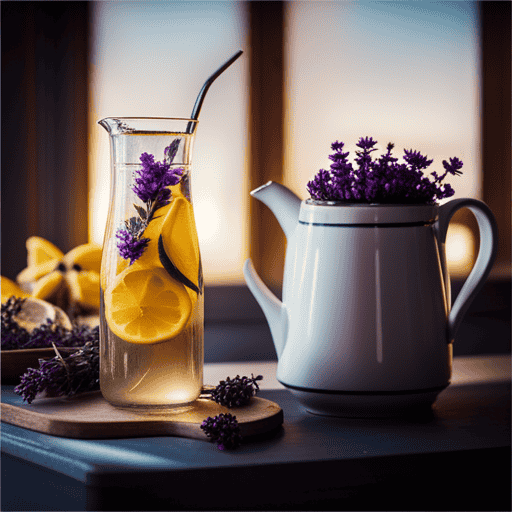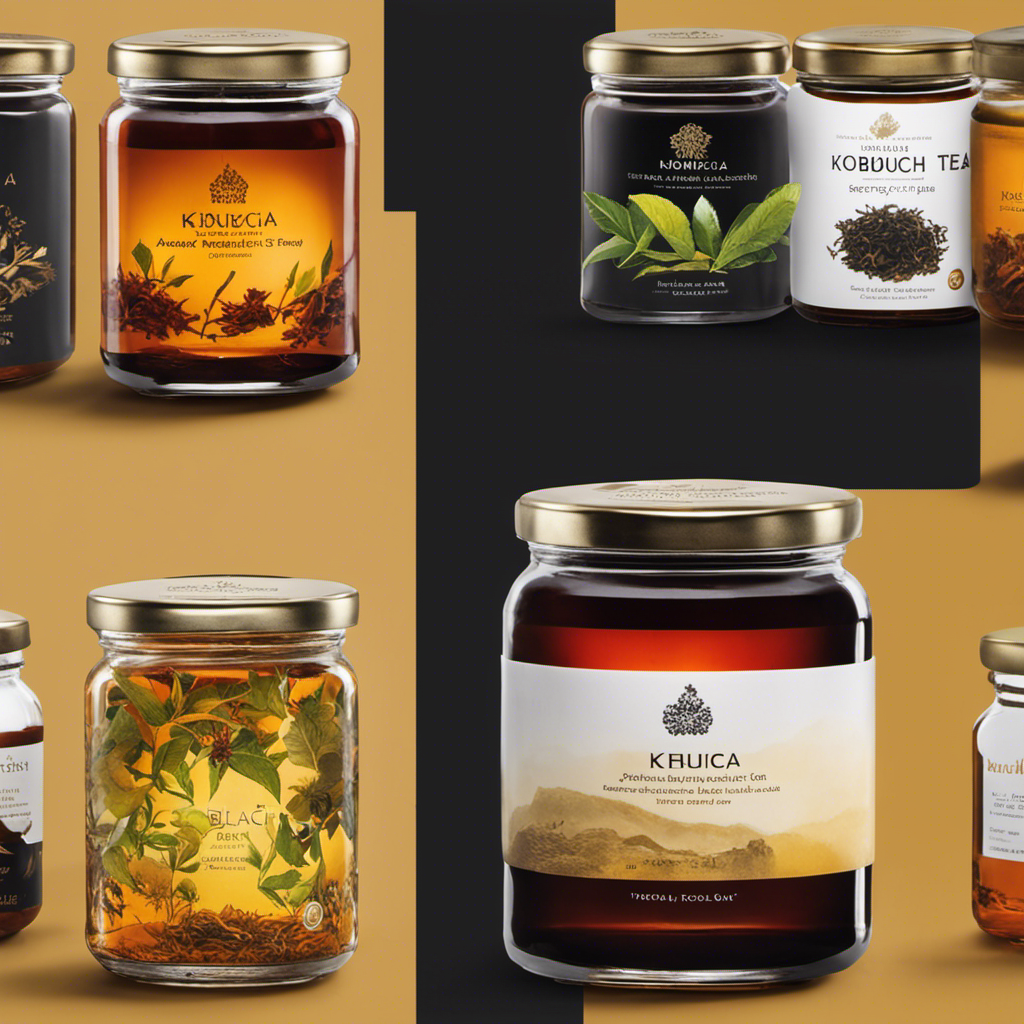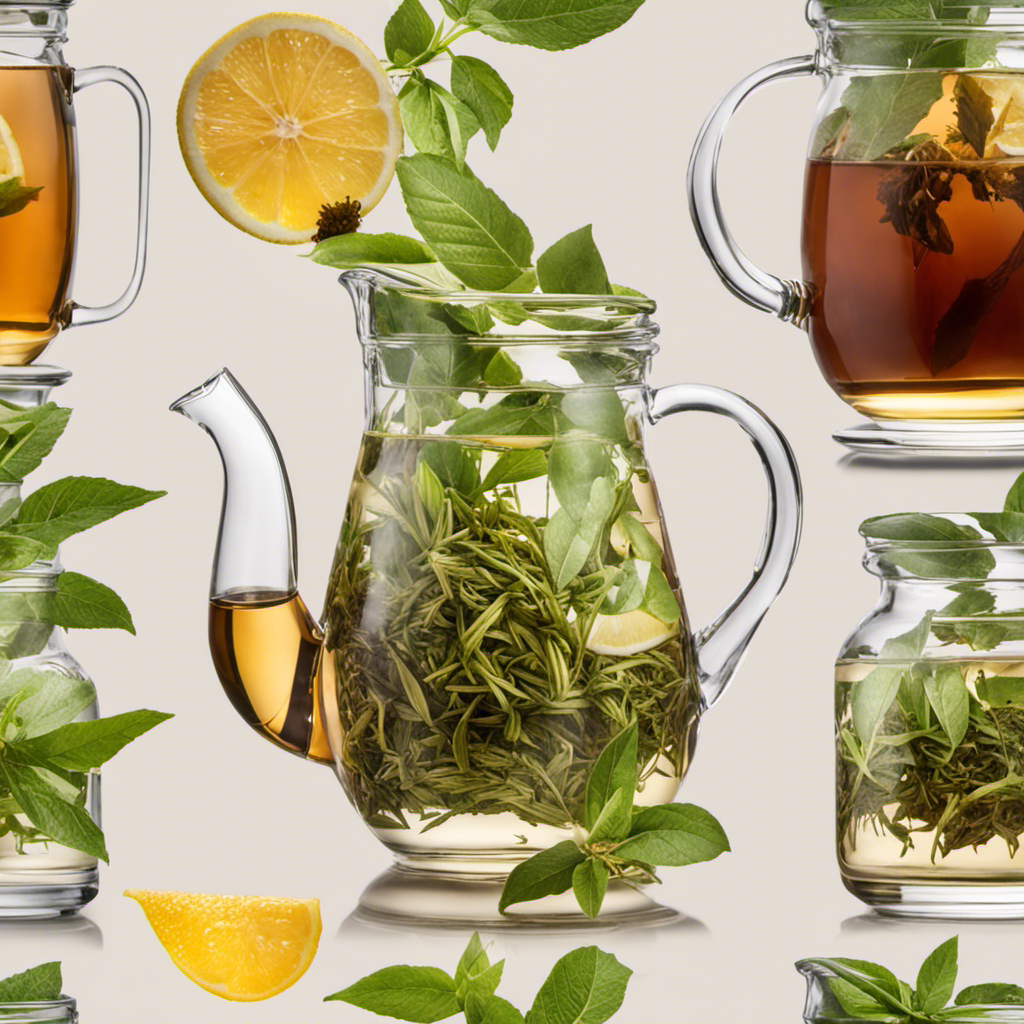Coffee Alternatives And Tea
Refreshing Homemade Lemonade With Earl Grey Lavender Tea

When life hands you lemons, why settle for ordinary lemonade? Step up your game with a refreshing twist that will tantalize your taste buds and transport you to a world of elegance and tranquility.
Picture this: the vibrant zing of citrus perfectly balanced with the delicate floral notes of Earl Grey lavender tea. It’s a harmonious union of flavors that will leave you craving more.
In this article, I will guide you through the art of creating homemade lemonade with Earl Grey lavender tea. By infusing the tea with a simple syrup made from equal parts sugar and water, we unlock a symphony of flavors that will awaken your senses.
Meyer lemons, with their natural sweetness, are the perfect choice to complement the tea’s enchanting aroma.
But it’s not just about taste. Lavender, known for its calming effects, combined with the cleansing properties of lemon juice, make this lemonade a truly invigorating experience.
So, grab your glass containers and get ready to indulge in a beverage that is as sophisticated as it is delicious. Let’s dive into the world of refreshing homemade lemonade with Earl Grey lavender tea.
Key Takeaways
- Homemade lemonade with Earl Grey lavender tea is a delightful and refreshing beverage option.
- Making a simple syrup with Earl Grey tea and lavender adds a unique and flavorful twist to the lemonade.
- Meyer lemons are recommended for a sweeter and less acidic taste in the lemonade.
- Storing the simple syrup in glass containers in the refrigerator allows for easy access and preservation.
Recipe Ingredients
To make this refreshing homemade lemonade with Earl Grey lavender tea, I’ll need a few key ingredients. First, I’ll need Earl Grey lavender tea, which is a delightful combination of black tea infused with fragrant bergamot oil and dried lavender flowers. Premium brands like Adagio and Rishi offer high-quality Earl Grey teas that provide the best flavor.
Additionally, I’ll need Meyer lemons for a sweeter and less acidic taste.
Now, let’s talk about the Earl Grey lavender simple syrup, which is the star of this recipe. Not only does it add a subtle sweetness to the lemonade, but it can also be used in other creative ways. You can drizzle it over pancakes or waffles, mix it into cocktails, or even use it to flavor homemade ice cream. The possibilities are endless! So, don’t limit yourself to just making lemonade. Get creative and explore the many ways you can use this delicious Earl Grey lavender simple syrup in your cooking and baking endeavors.
Making the Simple Syrup
First, I gently heat equal parts sugar and water in a saucepan to create a simple syrup. For this refreshing homemade lemonade with Earl Grey lavender tea, I suggest using different types of tea for the simple syrup to add unique flavors.
In addition to Earl Grey tea, you can experiment with other black teas like Assam or Darjeeling for a stronger and more robust taste. If you prefer a healthier option, you can also use alternative sweeteners such as honey or maple syrup instead of sugar. These natural sweeteners will add a subtle depth of flavor to the syrup.
Whichever tea or sweetener you choose, make sure to dissolve the sugar or sweetener completely in the water without boiling it. This will ensure a smooth and well-balanced simple syrup that perfectly complements the lemonade.
Preparing the Tea Infusion
For the tea infusion, I steep the Earl Grey lavender tea and dried lavender flowers in the simple syrup, allowing the flavors to meld together before straining the mixture.
This step is crucial to infuse the syrup with the floral notes of the lavender and the aromatic bergamot essence of the Earl Grey tea.
The organic ingredients used in this recipe enhance the overall taste and provide additional health benefits. By using organic dried lavender flowers and Meyer lemons, you can ensure a purer and more natural flavor profile.
Additionally, there are various variations of homemade lemonade that you can explore. For a twist, you can add fresh mint leaves or replace the water with sparkling water for a fizzy lemonade.
The possibilities are endless, allowing you to customize your refreshing homemade lemonade to suit your taste preferences.
Frequently Asked Questions
How long does the homemade lemonade with Earl Grey lavender tea last in the refrigerator?
The homemade lemonade with Earl Grey lavender tea can last in the refrigerator for up to two weeks. To maximize its shelf life, store it in an airtight container. Enjoy this refreshing drink like a cool breeze on a summer day.
Can I use regular tea bags instead of premium Earl Grey tea for the infusion?
Yes, you can use regular tea bags instead of premium Earl Grey tea for the infusion. Additionally, alternative sweeteners like honey or agave syrup can be used in the simple syrup recipe.
Are there any alternative sweeteners that can be used instead of sugar for the simple syrup?
There are several alternative sweeteners that can be used instead of sugar for the simple syrup, such as honey, maple syrup, or stevia. Using natural sweeteners can provide additional health benefits and add unique flavors to the homemade lemonade.
Can I use fresh lavender instead of dried lavender flowers for the recipe?
Yes, fresh lavender flowers can be used instead of dried lavender flowers in the recipe. As for alternative sweeteners for the simple syrup, options like honey, maple syrup, or stevia can be used based on personal preference.
Is it possible to make the lemonade without using the simple syrup?
Other ways to sweeten homemade lemonade without using simple syrup include using honey as a natural sweetener. Yes, it is possible to use honey in the lemonade recipe. It adds a distinct flavor and can be adjusted to personal taste.
Conclusion
In conclusion, making homemade lemonade with Earl Grey lavender tea is a refreshing and delightful experience. The combination of the floral notes from the lavender and the rich flavor of Earl Grey tea creates a unique and satisfying beverage.
By using Meyer lemons, the lemonade isn’t overly sweet and has a balanced taste. The simple syrup adds a touch of sweetness without overpowering the flavors.
Storing the lemonade in glass containers ensures freshness, and the syrup can be stored for up to two weeks.
Enjoy the calming effects of lavender and the cleansing properties of lemon juice while indulging in this delicious homemade lemonade.
In the vast and diverse world of coffee, coffee alternatives, and tea, Olivia has found her calling. As an author and a dedicated coffee and tea aficionado, her work for Cappuccino Oracle reflects her profound love and understanding of the intricate complexities found within these beverages. Olivia’s passion for the subject serves as both a catalyst for her creativity and a connection point with her audience.
Olivia’s appreciation for coffee, coffee alternatives, and tea blossomed at an early age. She discovered that these beverages invigorated her senses and stimulated her creative spirit. From the nuanced flavors of single-origin roasts to the captivating narratives intertwined with coffee, coffee alternatives, and tea trade and culture, Olivia found an unlimited source of inspiration in her daily cup.
Her love for these beverages and her talent for storytelling eventually converged at Cappuccino Oracle. As an author, Olivia’s mission is to illuminate the intricate tapestry that makes up the world of coffee, coffee alternatives, and tea. Her articles span a diverse range of topics, encompassing everything from the unique flavors of different brews to the sociocultural history intertwined with their cultivation and consumption.
Turmeric Tea
Which Black Tea Best for Kombucha

As a dedicated kombucha lover, I have always believed that the secret to a tasty brew is in the selection of black tea.
With its rich, robust flavors and numerous health benefits, black tea is the perfect partner for fermenting this beloved probiotic drink.
But with so many options out there, how do you choose the best black tea for your kombucha?
Fear not, for in this article, I will guide you through the factors to consider, popular varieties, and expert tips to help you find that perfect cuppa for your next batch of bubbly goodness.
Key Takeaways
- Black tea contains polyphenols and antioxidants that aid in the growth of beneficial bacteria and yeast during fermentation.
- High-quality loose-leaf black tea is preferred over tea bags for better flavor extraction.
- Steeping black tea for the recommended time and at the right temperature is crucial for achieving desired strength and flavor.
- Popular varieties of black tea for kombucha brewing include Assam, Darjeeling, Ceylon, Earl Grey, and Lapsang Souchong.
Health Benefits of Black Tea for Kombucha
Black tea is a great choice for making kombucha because it provides you with numerous health benefits. When it comes to fermentation, black tea contains polyphenols and antioxidants that aid in the growth of beneficial bacteria and yeast. These microorganisms are crucial for the fermentation process, transforming the tea into a tangy and fizzy probiotic drink.
Additionally, black tea is rich in catechins, which have been linked to improved cardiovascular health and reduced risk of chronic diseases.
To maximize the benefits of fermentation, it is important to use high-quality black tea leaves. Loose-leaf black tea is preferred over tea bags as it allows for better flavor extraction. When brewing black tea for kombucha, it is essential to use filtered water and steep the tea for the recommended time to achieve the desired strength. The temperature at which the tea is brewed is also crucial, as higher temperatures can result in a bitter taste.
Factors to Consider When Choosing Black Tea for Kombucha
When choosing tea for your kombucha, it’s important to consider factors like the type of tea leaves and their fermentation process.
The flavor profiles of different types of tea can greatly impact the taste of your kombucha. For example, black tea offers a robust and full-bodied flavor that adds depth to your brew. Additionally, black tea generally contains a higher caffeine content compared to other teas, which can provide an energizing boost.
The fermentation process also plays a role in the development of flavor and caffeine levels. Longer fermentation times tend to result in a smoother and less bitter taste, while shorter fermentation times may lead to a stronger and more acidic flavor.
Now, let’s explore some popular varieties of black tea for kombucha brewing.
Popular Varieties of Black Tea for Kombucha Brewing
To enhance the flavors in your kombucha, consider the different varieties of black tea available. Black tea provides a rich and robust base for kombucha fermentation, and different types can add unique flavors and nuances to your brew.
Here are four popular varieties of black tea that are commonly used in kombucha brewing:
-
Assam: Known for its malty and full-bodied flavor, Assam black tea is perfect for creating a bold and robust kombucha. It is typically fermented for a longer period to develop its rich flavor profile.
-
Darjeeling: With its delicate and floral notes, Darjeeling black tea adds a subtle and elegant flavor to kombucha. It is often preferred by those who enjoy a lighter and more nuanced brew.
-
Ceylon: Ceylon black tea offers a bright and citrusy flavor, making it a popular choice for kombucha enthusiasts seeking a refreshing and tangy taste.
-
Earl Grey: Infused with the essence of bergamot, Earl Grey black tea lends a unique and aromatic twist to kombucha. It adds a hint of citrus and floral undertones, creating a delightful and sophisticated brew.
Experimenting with different black teas allows you to tailor the flavor of your kombucha to your preferences. Remember to follow proper brewing methods and adjust steeping times accordingly to achieve the desired flavor profile.
Steeping Techniques for Extracting Maximum Flavor in Kombucha
Steeping techniques can greatly enhance the flavor extraction in your kombucha, allowing you to create a more robust and flavorful brew. The steeping time and water temperature play crucial roles in achieving the desired flavors.
For black tea, the recommended steeping time is usually around 3 to 5 minutes. This allows the tea leaves to fully release their flavors without becoming too bitter or astringent. As for water temperature, it is best to use water that is just below boiling, around 195 to 205 degrees Fahrenheit. This temperature range ensures proper extraction of the tea’s compounds, resulting in a well-balanced flavor profile.
It’s important to note that different teas may require slight adjustments in steeping time and water temperature, so it’s always a good idea to experiment and find what works best for your taste preferences.
Happy brewing!
Expert Tips for Using Black Tea in Kombucha Fermentation
Using black tea in kombucha fermentation can really enhance the flavor profile of your brew. As an avid kombucha brewer, I have experimented with different types of black tea and found some expert tips to share with you.
Here are four key brewing techniques and alternative tea options to consider:
-
Assam: This robust black tea adds a malty and earthy flavor to your kombucha, giving it a rich and full-bodied taste.
-
Darjeeling: Known as the ‘Champagne of Teas,’ Darjeeling imparts a delicate and floral note to your brew, creating a more refined and elegant flavor profile.
-
Earl Grey: Infused with bergamot oil, Earl Grey tea brings a citrusy and aromatic twist to your kombucha, adding a refreshing and zesty touch.
-
Lapsang Souchong: This unique black tea is smoked over pine wood, lending a distinct smoky flavor to your brew, perfect for those who enjoy a bold and intense taste experience.
By experimenting with different brewing techniques and alternative tea options, you can create a customized kombucha flavor that suits your taste preferences.
Happy brewing!
Conclusion
After exploring the health benefits, factors to consider, popular varieties, and steeping techniques for black tea in kombucha fermentation, it is clear that the choice of black tea greatly impacts the flavor and quality of the final brew.
The rich and robust flavors of Assam black tea evoke images of rolling hills in India, while the floral and citrus notes of Darjeeling black tea transport us to the serene tea gardens of the Himalayas.
Whichever variety you choose, the art of kombucha brewing with black tea is a journey that promises to delight the senses and nourish the body.
Arf, an author and an innovative enthusiast of coffee, coffee alternatives, and tea, plays a crucial role as a contributor to the esteemed Cappuccino Oracle platform. Renowned for his curiosity and passion for these captivating beverages, Arf has carved out a unique space for himself in the world of exploration and writing. He realized that coffee, coffee alternatives, and tea are not mere drinks to keep one awake, but universes of flavors and stories waiting to be explored.
Arf’s articles for Cappuccino Oracle blend meticulous research with personal experiences, providing readers with an in-depth understanding of various types of coffee, coffee alternatives, and tea, along with their unique characteristics, cultures, and histories. His honest reviews and engaging narratives guide readers on their own journeys, helping them discover their preferences and find their perfect brew.
Turmeric Tea
How Long to Steep Green Tea for Kombucha

As someone who loves tea, I have found that the key to making the best kombucha is mastering the process of brewing green tea.
The right amount of time can make all the difference in unlocking the vibrant flavors and health benefits.
Join me on this journey as we delve into the world of steeping, exploring the factors that influence the process and uncovering the recommended steeping time for green tea in kombucha.
Get ready to sip your way to kombucha perfection!
Key Takeaways
- Steeping time is crucial for unlocking optimal flavors in green tea for kombucha.
- Different types of green tea require different steeping times.
- Steeping green tea in kombucha for 3-5 minutes is generally recommended to release flavors and antioxidants without excessive bitterness.
- Adjusting steeping time allows customization of the tea to personal taste, ranging from mild and subtle to bold and robust flavor profiles.
Understanding the Importance of Steeping Time
To achieve the best flavor and health benefits, you should steep your green tea for the recommended amount of time.
Steeping time is crucial when it comes to exploring optimal flavors in your tea. Different types of green tea require different steeping times to release their full potential.
Experimenting with different teas can be a fun and exciting way to discover your personal preferences. Some teas may need only a couple of minutes to steep, while others may require a longer steeping time.
It is important to follow the instructions provided by the tea manufacturer or use a general guideline for steeping time, usually ranging from 1 to 3 minutes.
Understanding the importance of steeping time will allow you to fully enjoy the flavors and health benefits of green tea.
Now, let’s delve into the factors that influence steeping time.
Factors That Influence Steeping Time
Factors such as water temperature, tea quality, and personal preference can affect how long you should let the leaves steep. The brewing techniques used, along with these factors, play a crucial role in flavor extraction.
Water temperature is key, as different types of tea require specific temperatures to bring out their optimal flavors. For green tea, a lower temperature of around 175°F is recommended to prevent bitterness.
Additionally, the quality of the tea leaves can impact the steeping time. Higher quality leaves often require less time to extract their flavors fully.
Lastly, personal preference plays a significant role. Some individuals may prefer a stronger, more robust flavor and may choose to steep the tea for a longer duration.
Now, let’s dive into the recommended steeping time for green tea in kombucha.
Recommended Steeping Time for Green Tea in Kombucha
The ideal amount of time to let the leaves infuse in this fermented beverage can vary depending on personal taste preferences and the desired strength of flavor. When it comes to green tea in kombucha, the recommended steeping time is generally around 3-5 minutes. This allows the tea to release its flavors and antioxidants without becoming too bitter. Green tea is a popular choice for kombucha due to its numerous health benefits. It is rich in antioxidants, which help to reduce inflammation and boost the immune system. Additionally, green tea contains a compound called EGCG, which has been shown to have anti-cancer properties. By steeping green tea for the recommended amount of time, you can ensure that your kombucha has a balanced and refreshing taste, while also reaping the benefits of this powerful tea.
| Steeping Time | Flavor Profile |
|---|---|
| 3 minutes | Light and delicate |
| 4 minutes | Balanced and smooth |
| 5 minutes | Robust and full-bodied |
Oversteeping Vs. Understeeping: Finding the Sweet Spot
Finding the perfect balance of flavor when steeping your tea is crucial. Oversteeping or understeeping can greatly impact the taste of your beverage.
Oversteeping can lead to a bitter and astringent flavor that overwhelms the delicate notes of the tea. This happens because the longer the tea leaves steep, the more tannins are released, resulting in a harsh taste.
On the other hand, understeeping can leave your tea tasting weak and lacking in depth. The flavors and aromas may not fully develop, leaving you with a bland and unsatisfying cup.
It’s important to follow the recommended steeping times for different types of tea to achieve the desired flavor profile. By finding the sweet spot, you can ensure a perfectly balanced and enjoyable tea experience.
Adjusting Steeping Time for Personal Preference
To customize your tea to your taste, experiment with adjusting the steeping time to find the perfect balance of flavor. When it comes to green tea for kombucha, the steeping time can greatly impact the taste and quality of your brew. Adjusting the steeping time allows you to control the strength and intensity of the flavor, whether you prefer a mild and subtle taste or a bolder and more robust flavor profile. Experimenting with different steeping times is the key to finding your preferred taste. To help you get started, here is a table outlining the general guidelines for steeping green tea for kombucha:
| Steeping Time | Flavor Profile |
|---|---|
| 1-2 minutes | Light and delicate |
| 2-3 minutes | Balanced and smooth |
| 3-4 minutes | Full-bodied and bold |
| 4-5 minutes | Strong and robust |
| 5+ minutes | Bitter and astringent |
Conclusion
In conclusion, steeping green tea for kombucha is a delicate art that requires precision and attention to detail. By understanding the importance of steeping time and the factors that influence it, you can achieve the perfect balance of flavors in your brew.
Whether it’s the refreshing taste of a lightly steeped tea or the boldness of a longer steep, finding the sweet spot is key. So, experiment with different steeping times and adjust to your personal preference, creating a symphony of flavors that dances on your taste buds.
Noah, the Editor-in-Chief at Cappuccino Oracle, plays a pivotal role in shaping the voice and vision of our renowned platform. With an unwavering passion for coffee, coffee alternatives, and tea, Noah leads Cappuccino Oracle towards new horizons in the realm of coffee journalism.
Beyond his professional responsibilities, Noah serves as a mentor and guiding force for his team. His dedication to journalistic excellence and genuine love for coffee, coffee alternatives, and tea continue to inspire and motivate the Cappuccino Oracle family. In the ever-evolving world of these beverages, Noah’s leadership ensures that our platform remains at the forefront, delivering enlightening and enjoyable content to our readers worldwide.
Turmeric Tea
What Is the Benefits of Kombucha Tea

Were you aware that kombucha tea has been enjoyed for centuries because of its numerous health advantages?
In fact, studies have shown that this fermented beverage can improve digestion, boost the immune system, aid in weight management, and even support detoxification.
As someone who values holistic wellness, I am excited to share with you the evidence-based benefits of kombucha tea.
So, grab a glass and join me on this journey to discover the incredible advantages of this ancient elixir.
Key Takeaways
- Kombucha tea improves digestion.
- It boosts the immune system.
- Kombucha tea aids in weight management.
- It supports detoxification.
Health Benefits of Kombucha Tea
You’ll love the health benefits of kombucha tea, such as improved digestion and increased immune function.
But did you know that kombucha tea can also have positive effects on your skin health and mental wellness?
Kombucha tea contains beneficial acids, vitamins, and antioxidants that can promote a healthy complexion and reduce the signs of aging. It can also help improve the overall texture and tone of your skin.
As for mental wellness, kombucha tea is rich in B vitamins, which are essential for brain health and can help improve mood and reduce stress. Additionally, the probiotics in kombucha tea can support a healthy gut-brain connection, which is important for mental well-being.
With its numerous health benefits, kombucha tea is truly a holistic beverage that can enhance not only your physical health but also your skin and mental well-being.
Now, let’s explore how kombucha tea can boost digestive health even further.
Boosting Digestive Health With Kombucha Tea
Boosting digestive health can be achieved with the consumption of kombucha tea. Kombucha is a fermented tea that is rich in probiotics, which are beneficial bacteria that support gut health. These probiotics help to balance the bacteria in your digestive system, promoting optimal digestion and nutrient absorption.
The live cultures in kombucha tea can also help to improve the function of your gut by reducing inflammation and enhancing the production of enzymes that aid in the breakdown of food. Additionally, kombucha tea contains organic acids that can support the growth of good bacteria in your gut and inhibit the growth of harmful bacteria.
Kombucha Tea and Its Impact on Immune System
Drinking kombucha can improve your immune system by supporting the growth of beneficial bacteria in the gut. The immune system plays a crucial role in protecting our bodies from infections and diseases. Research suggests that the gut microbiota, which consists of trillions of bacteria, fungi, and other microbes, plays a significant role in immune system support.
Kombucha, a fermented tea, contains probiotics that can help enhance the diversity and balance of the gut microbiota. This can lead to a stronger immune response and potentially reduce the risk of allergies. Studies have shown that probiotics found in kombucha can modulate the immune system and help alleviate symptoms of allergies.
So, incorporating kombucha into your diet may have beneficial effects on your immune system and overall health.
Speaking of health benefits, let’s explore how kombucha tea can aid in weight management.
Weight Management and Kombucha Tea
Incorporating kombucha into your diet can help with weight management by promoting a healthy metabolism and supporting a balanced gut microbiota. Here are four ways that kombucha tea can benefit your weight management journey:
-
Boosts metabolism: Kombucha contains organic acids and enzymes that can help increase your metabolic rate, allowing your body to burn calories more efficiently.
-
Supports gut health: The probiotics found in kombucha can help restore and maintain a healthy balance of bacteria in your gut. This is important for weight management as an imbalanced gut microbiota has been linked to weight gain and obesity.
-
Reduces cravings: Kombucha can help curb your cravings for sugary and unhealthy foods. Its tangy and slightly sweet taste can satisfy your taste buds and prevent you from reaching for unhealthy snacks.
-
Provides hydration: Staying hydrated is essential for weight management, and kombucha can be a refreshing and hydrating beverage option.
The Role of Kombucha Tea in Detoxification
Detoxification can be supported by incorporating kombucha into your diet, as it aids in promoting a healthy gut microbiota. Kombucha tea is known for its numerous health benefits, including its ability to support liver function. The liver plays a vital role in detoxification, as it helps remove toxins from the body.
Kombucha tea contains beneficial acids and antioxidants that can help protect the liver and support its detoxification processes. Additionally, kombucha tea has been found to have positive effects on skin health. The antioxidants and probiotics present in kombucha can help improve skin elasticity and reduce the appearance of wrinkles.
Incorporating kombucha tea into your daily routine can be a great way to support your body’s natural detoxification processes and promote overall health and well-being.
Conclusion
In conclusion, the benefits of kombucha tea are numerous and can greatly contribute to our overall health and well-being.
With its ability to boost digestive health, strengthen the immune system, aid in weight management, and support detoxification, kombucha tea is a powerful elixir.
One interesting statistic to highlight is that kombucha tea contains probiotics, which are beneficial bacteria that can improve gut health. In fact, a single serving of kombucha tea can contain billions of these probiotics, promoting a healthy digestive system.
Incorporating kombucha tea into our daily routine can have a profound impact on our health.
Noah, the Editor-in-Chief at Cappuccino Oracle, plays a pivotal role in shaping the voice and vision of our renowned platform. With an unwavering passion for coffee, coffee alternatives, and tea, Noah leads Cappuccino Oracle towards new horizons in the realm of coffee journalism.
Beyond his professional responsibilities, Noah serves as a mentor and guiding force for his team. His dedication to journalistic excellence and genuine love for coffee, coffee alternatives, and tea continue to inspire and motivate the Cappuccino Oracle family. In the ever-evolving world of these beverages, Noah’s leadership ensures that our platform remains at the forefront, delivering enlightening and enjoyable content to our readers worldwide.
-

 Americano4 weeks ago
Americano4 weeks agoHow to Make Americano With Moka Pot
-

 Americano2 weeks ago
Americano2 weeks agoHow to Make Korean Iced Americano
-

 Americano4 weeks ago
Americano4 weeks agoHow to Make Americano With Bialetti
-

 Americano4 weeks ago
Americano4 weeks agoHow to Make Dutch Bros Americano
-

 Americano1 week ago
Americano1 week agoHow to Make an Iced Americano With Nespresso
-

 Americano3 weeks ago
Americano3 weeks agoHow Many Shots of Espresso for 16 Oz Americano
-

 Americano4 weeks ago
Americano4 weeks agoHow to Make a Hazelnut Americano
-

 Turmeric Tea2 weeks ago
Turmeric Tea2 weeks agoTurmeric Saffron Tea















